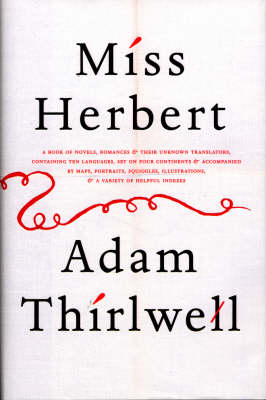The secret history of novelists is often a history of exile and tourism - a history of language learning. Like the story of Gustave Flaubert and Juliet Herbert, it is a history of loss and mistakes. Flaubert's niece was taught by an English governess: Juliet Herbert. As Flaubert finished "Madame Bovary", Miss Herbert translated his novel into English. But this translation has since been lost. No photographs of Miss Herbert survive, either. Translation, and emigration, is the way into a new history of the novel - a history of loss, of mistakes. We assume that we can read novels in translation. We also assume that style does not translate. But the history of the novel is the history of style. "Miss Herbert" solves this conundrum.The book travels from Rio de Janeiro to Prague, from Moscow to London, from Trieste to Paris, from Warsaw to New York. On its zigzagging flight, it reinvents our ideas of style, and translation - introducing new theories of jet lag, of the time difference. "Miss Herbert" finds problems with accurate translations, and praises imperfect ones. It dismisses history and politics, replacing them with the fun of literary games.
This is not a novel, but an inside-out novel - with novelists as characters. But "Miss Herbert" is not just a book. It demonstrates a new way of reading internationally. It is a project, a book of tricks - complete with maps, illustrations, and a variety of helpful diagrams. And it comes with a companion, a slim appendix: "Mademoiselle O", a story by Vladimir Nabokov, written in French, about his own governess, never before fully translated into English. "Miss Herbert" is a bedside travel book, a comprehensive city break: the most original and most stylish beach read.
- ISBN10 022408139X
- ISBN13 9780224081399
- Publish Date 25 October 2007
- Publish Status Out of Print
- Out of Print 10 August 2021
- Publish Country GB
- Publisher Vintage Publishing
- Imprint Jonathan Cape Ltd
- Format Hardcover
- Pages 592
- Language English
